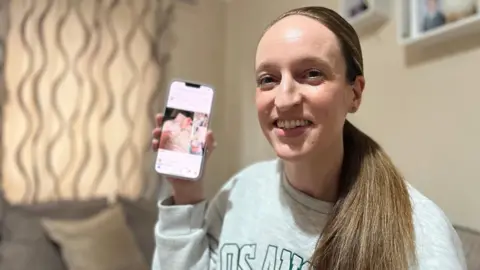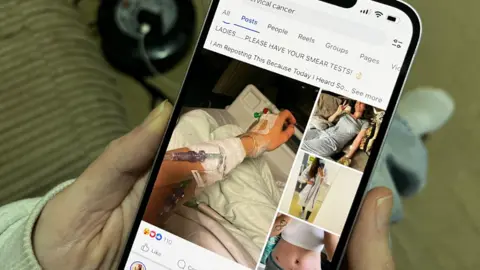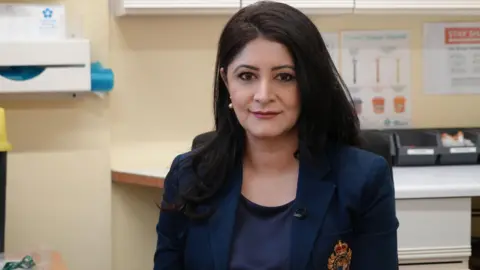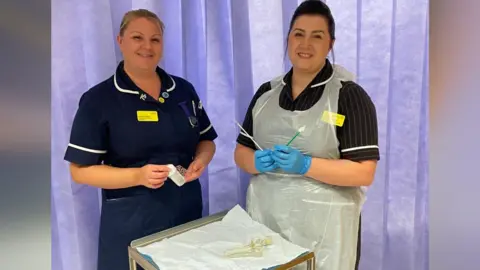'Smear test is worth the pain, it saved my life'
 Emma Baugh / BBC
Emma Baugh / BBCA woman who survived cervical cancer has advocated the importance of smear tests after she said having one saved her life.
Stacey Roberts, 37, from Peterborough, has been in remission for three years after being diagnosed with the illness aged 34, and said she feels "proud" of her journey.
NHS England said around one in three women take up their invite to get a cervical screening, even though 75% of cervical cancers can be prevented by the test.
Ms Roberts said: "Screenings save lives. It saved mine. It is uncomfortable, but think of the bigger picture."
 Emma Baugh / BBC
Emma Baugh / BBCNorth West Anglia Foundation Trust has renewed its plea for women to attend their smear test appointment during Cervical Cancer Prevention Week, which is marked between 20-26 January.
The screening tests for the presence of human papillomavirus (HPV) - which is the virus that causes cervical cancer - and is offered by the NHS to all women and people with a cervix aged between 25 and 64.
The test involves taking a sample of cells from the cervix. If any abnormal cells are found, they can be removed or monitored to prevent cancer developing.
However, according to latest NHS England data, more than five million eligible women are not up to date with their routine screening, with the lowest uptake among women aged between 25 and 29 (58%).
In 2022-23, 74% of women aged 50 and over who were invited to attend did so, said NHS England.
'I became numb'
When Ms Roberts, who is a mum of two, was diagnosed with cervical cancer she recalled having no symptoms and being "healthy and active".
She said: "At the hospital when she said it was cancer. I became numb.
"I kept thinking of my children… the emotions I went through… three years in remission I still look back and realise… it was tough," she said.
"If I can help just one person and encourage them to get a test, I know I did good.
"I share my stories sometimes even on the school run. But you hear things like it's 'embarrassing, uncomfortable'… but the pain is worth it I would say.
"I am glad I got the test done - what if I had missed it? The thought of my children growing up without their mum… you have to think about the bigger picture."
 Emma Baugh/ BBC
Emma Baugh/ BBCSome women told the BBC they faced "cultural barriers" and "health challenges" which prevented them from having a smear test.
A disabled woman, who wished to remain anonymous, said she found the "facilities inaccessible" and the table that was used for the screening was "too high to get on to".
Another woman from Peterborough who has Polycystic ovary syndrome (PCOS), which is a hormonal condition that causes irregular bleeding, said her condition affected her ability to get a timely smear test.
Dr Shabina Asad Qayyum, a GP and councillor who is the cabinet member for health and adult social care at Peterborough City Council, said the city had a diverse population and there was "no staunch data that there is a low uptake from only within certain cultures".
She added: "There is some perception that women from certain ethnicities who are not sexually active may not get a test, as it is seen as an invasive procedure, and culturally sexual health is a sensitive topic to talk about."
"But it calls for a more educational insight on how to make women aware of the screening which can save lives.
"Provisions are always made for someone who shares they have specific requirements.
"Speak to us in an open manner and be reassured we will take their concerns on board and try and make their experience comfortable."
 NWAFT
NWAFTAccording to Cancer Research UK, cervical screenings save at least 2,000 lives each year in the UK.
A spokesperson for NHS Cambridgeshire and Peterborough said: "North Cambridgeshire and Peterborough Care Partnership, part of Cambridgeshire & Peterborough Integrated Care System, have received funding from the East of England Cancer Alliance to run outreach clinics and education sessions encouraging those who've never had a cervical screening test or have not had one for a long time.
"A range of cervical screening facts videos in several languages have been recorded to support in raising awareness of the importance of cervical screening, to engage diverse communities and overcome language and cultural barriers locally."
Follow Peterborough news on BBC Sounds, Facebook, Instagram and X.
